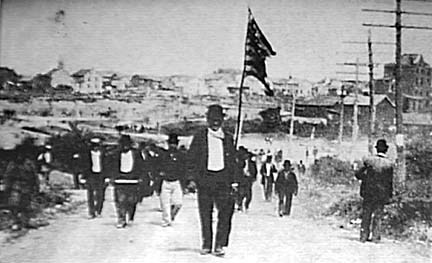Bits of News
September 11, 2007
By Garrett Johnson
On a dreary morning in May of 1920
7 men carrying winchesters and
pistols boarded the Norfolk and
Western's No. 29 at Bluefield, WV
bound for Matewan on the KY border.
(Robert Shogan)It was the only time in American history that government airplanes intentionally bombed its own citizens. It was the largest armed insurrection fought on American soil since the Civil War. And it has been almost totally forgotten outside of the lore of the United Mine Workers of America (UMWA).
"Ain't but two sides to this world. Them that work and them that don't. You work, they don't. That's all you got to know about the enemy."
(character Joe Kenehan, from the movie Matewan)The UMWA was founded in Columbus, Ohio in 1890.
At the time, miners were often immigrants from central and eastern Europe that didn't speak English, thus making them easy to exploit. This was reflected in the first UMWA constitution, which barred discrimination based on "race, religion or national origin".
Most often miners were paid in company script that could only be used at company stores and to pay for company housing. This left them vulnerable to high monopoly prices. A miner was completely unable to save money.
Miners were only paid for tons of ore mined. The owners picked out the man, who weighed the ore, thus leaving the miner vulnerable to being cheated. Miners weren't paid for any other necessary duty, such as laying down tracks or putting in supports, so the mine didn't collapse on them. The average workweek was 6 days, 10 hours a day.
Mining safety laws were either nonexistent, or simply ignored. Besides Black Lung disease and other occupational hazards that the mine owners ignored, mine explosions and collapses were far too common for any moral defense. Having children work in the mines was common practice.
But the most common complaint from miners was the Yellow Dog Contract that they were forced to sign, when going to work. Until it was outlawed in 1932, any miner, who even talked about unionizing, was legally fired and blacklisted. Of course, this also meant having his family kicked out of their home. Mine owners employed dozens or even thousands of thugs (depending on the size of the company) to enforce company policy.
The suffering of America's miners was largely ignored by a country that often didn't want the immigrants, anyway and their strikes were often met with deadly violence. The Pinkerton Agency cut its teeth on murdering immigrant miners in the 1870s.
Shortly after its creation the UMWA met its first crisis: the Lattimer Massacre.
"I bet, I drop six of them, when I get over there."
(one deputy boasting shortly before killing unarmed miners)
Lattimer marchers19 unarmed miners were shot down by a local posse and 6 more later died of their wounds. Most of the miners were shot in the back, as they ran towards a schoolhouse for safety. Although 78 deputies stood trial for their crime, none of them were ever convicted despite the fact that the strikers inflicted no violence.
While the massacre may have crushed the 1897 strike, it was also directly responsible for 15,000 miners joining the UMWA.
